Chromolume Theatre offers Stephen Sondheim aficionados the chance to catch the rarely performed Pacific Overtures, and though the musical itself will probably never rank high on my list of Sondheim favorites, its many fans will find much to admire in this full-length intimate staging.
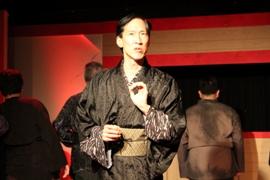 Recounting the arrival of Admiral Matthew C. Perry and his flotilla in Japanese waters circa 1853 and the influence these self-proclaimed “pacific overtures” had on a feudal society that had for centuries prided itself on being free from Western influences, John Weidman’s book (additional material by Hugh Wheeler) and its accompanying Sondheim songs do so as if told by Japanese performers in ancient Kabuki style and narrated by an all-seeing, all-knowing Reciter (Paul Wong, doubling as the Emperor).
Recounting the arrival of Admiral Matthew C. Perry and his flotilla in Japanese waters circa 1853 and the influence these self-proclaimed “pacific overtures” had on a feudal society that had for centuries prided itself on being free from Western influences, John Weidman’s book (additional material by Hugh Wheeler) and its accompanying Sondheim songs do so as if told by Japanese performers in ancient Kabuki style and narrated by an all-seeing, all-knowing Reciter (Paul Wong, doubling as the Emperor).
Bringing news of the Americans’ imminent arrival to Lord Abe (Marcel Licera), the Shogun’s second in command, is Japanese fisherman John Manjiro (Daryl Leonardo), long ago lost at sea, rescued by Americans, and now returned to the motherland after years spent in the U.S.
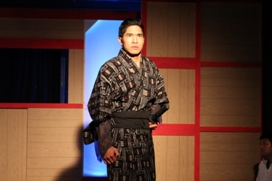 Rather than deal with the lowly Americans himself, Lord Abe comes up with the idea of promoting minor samurai Kayama Yesaemon (Cesar Cipriano) to Prefect Of Police, then orders him to inform Perry that he and his fleet are unwelcome in The Land Of The Rising Sun.
Rather than deal with the lowly Americans himself, Lord Abe comes up with the idea of promoting minor samurai Kayama Yesaemon (Cesar Cipriano) to Prefect Of Police, then orders him to inform Perry that he and his fleet are unwelcome in The Land Of The Rising Sun.
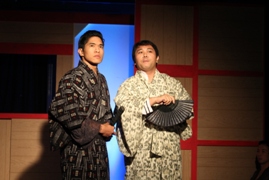 Unfortunately for Lord Abe, the Americans tell Kayama he’s too small potatoes to merit Perry’s attention, and so a plan is hatched to have American-culture-savvy Manjiro pose as the Shogun’s Lord Councilor in hopes the Yanks will pay him more heed than they did a mere police prefect.
Unfortunately for Lord Abe, the Americans tell Kayama he’s too small potatoes to merit Perry’s attention, and so a plan is hatched to have American-culture-savvy Manjiro pose as the Shogun’s Lord Councilor in hopes the Yanks will pay him more heed than they did a mere police prefect.
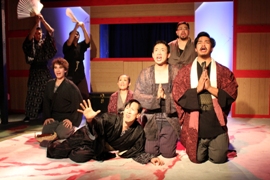 Also figuring in the action are Kayama’s wife Tamate (Julia May Wong), certain her husband’s failure will bring shame upon their house; the Shogun’s mother (Peter Jeensalute), who serves her son a very special cup of “Chrysanthemum Tea”; a quintet of foreign admirals (Daniel Koh, Jeensalute, Gibran Mahmud, Kevin Matsumoto, and John Sala), whose “Please Hello” pastiches each country’s distinctive musical style;
Also figuring in the action are Kayama’s wife Tamate (Julia May Wong), certain her husband’s failure will bring shame upon their house; the Shogun’s mother (Peter Jeensalute), who serves her son a very special cup of “Chrysanthemum Tea”; a quintet of foreign admirals (Daniel Koh, Jeensalute, Gibran Mahmud, Kevin Matsumoto, and John Sala), whose “Please Hello” pastiches each country’s distinctive musical style;
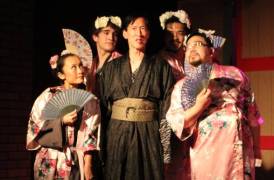 a Madam (Koh) and her stable of “ladies” of the evening, who inform the American visitors they are “Welcome To Kanagawa”; a pair of witnesses (Wong as Young Boy and Sala as Warrior) to the meeting between Perry (Matsumoto) and the Japanese, one who could only see from a distance and one who could only hear what was being said; and a trio of English sailors who discover the dire consequences of mistaking a samurai’s daughter for a geisha.
a Madam (Koh) and her stable of “ladies” of the evening, who inform the American visitors they are “Welcome To Kanagawa”; a pair of witnesses (Wong as Young Boy and Sala as Warrior) to the meeting between Perry (Matsumoto) and the Japanese, one who could only see from a distance and one who could only hear what was being said; and a trio of English sailors who discover the dire consequences of mistaking a samurai’s daughter for a geisha.
Pacific Overtures scores high marks for style, for its history lesson told through Japanese eyes (foreigners’ attempt to speak Japanese is heard in broken English), and for doing both with an all-Asian cast.
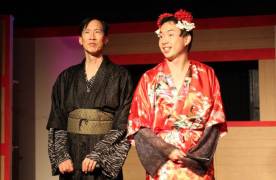 Weidman’s book, on the other hand, is far from the easiest to follow, and most of Sondheim’s songs (written to mimic the five-note Japanese scale) make the famously unhummable composer’s other scores seem positively show-tune-packed by comparison.
Weidman’s book, on the other hand, is far from the easiest to follow, and most of Sondheim’s songs (written to mimic the five-note Japanese scale) make the famously unhummable composer’s other scores seem positively show-tune-packed by comparison.
That being said, the cast assembled by director James Esposito (doing some imaginative work here) are a talented bunch, each of them offered the chance to shine, both as actors and as vocalists to Daniel Yokomizo’s expert musical direction/piano accompaniment.
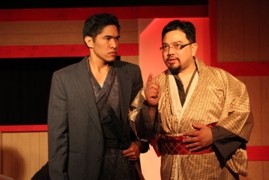 Wong’s Reciter and Licera’s Lord Abe give the production gravitas, Leonardo’s Manjiro gives it humor, Licera’s Lord Abe gives it hauteur, Jeensalute’s Mother and Koh’s Madam and her stable of “girls” give it drag, and Wong’s Tamate gives it an authentic female presence.
Wong’s Reciter and Licera’s Lord Abe give the production gravitas, Leonardo’s Manjiro gives it humor, Licera’s Lord Abe gives it hauteur, Jeensalute’s Mother and Koh’s Madam and her stable of “girls” give it drag, and Wong’s Tamate gives it an authentic female presence.
Sala and Wong’s “Someone In A Tree” is an Act One standout as is Cipriano’s “A Bowler Hat” in Act Two, and Mahmud proves the production’s finest singer and Matsumoto its finest dancer in a thrillingly graceful, athletic “Lion Dance,” just one of Michael Marchak’s many choreographic contributions. (A puppet-show sequence is another imaginative winner.)
Indeed, the production’s sole misstep is the awkward introduction of a non-Asian, non-cast member to the otherwise deliberately all-Asian ensemble, first, rather embarrassingly, as a workhorse dressed in of all things modern stagehand garb, and later, for no apparent reason (but at least in period costume), as Kayama’s servant, duties that could and should have been filled by ensemble members.
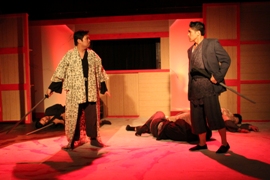 Hector Figueroa’s Japanese-flavored scenic design, one of Chromolume’s best, evokes sliding rice-paper doors, Kara McLeod scores high marks for her period costumes both realistic and fanciful, and Jesse Baldridge lights all of the above with considerable flair.
Hector Figueroa’s Japanese-flavored scenic design, one of Chromolume’s best, evokes sliding rice-paper doors, Kara McLeod scores high marks for her period costumes both realistic and fanciful, and Jesse Baldridge lights all of the above with considerable flair.
Veronica Vasquez is stage manager and Louis Lake III is assistant stage manager.
I may never take to Pacific Overtures as I have to Into The Woods, Sweeney Todd, Company, and Merrily We Roll Along, but for curiosity’s sake alone, Chromolume Theatre’s rarer-than-rare revival is worth a look-see. As for those who truly love the show, they I expect will find themselves in Sondheim heaven.
Chromolume Theatre at the Attic, 5429 W. Washington Blvd., Los Angeles.
www.crtheatre.com
–Steven Stanley
December 2, 2017
Photos: Ederson Vasquez
Tags: Hugh Wheeler, John Weidman, Los Angeles Theater Review, Stephen Sondheim



 Since 2007, Steven Stanley's StageSceneLA.com has spotlighted the best in Southern California theater via reviews, interviews, and its annual StageSceneLA Scenies.
Since 2007, Steven Stanley's StageSceneLA.com has spotlighted the best in Southern California theater via reviews, interviews, and its annual StageSceneLA Scenies.







 COPYRIGHT 2025 STEVEN STANLEY :: DESIGN BY
COPYRIGHT 2025 STEVEN STANLEY :: DESIGN BY